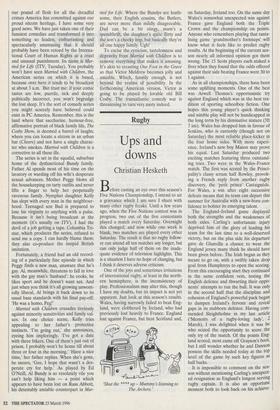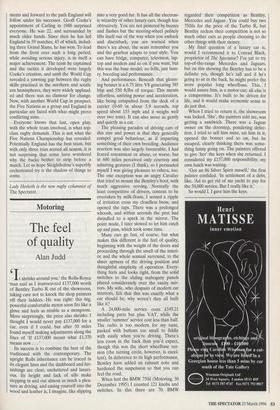Rugby
Ups and downs
Christian Hesketh
Before casting an eye over this season's Five Nations Championship, I intend to air a grievance which I am sure I share with many other rugby freaks. Until a few years ago, when the Five Nations contest was in progress, two out of the five contestants played a match every Saturday. Overnight this changed, and now while one week is blank, two matches are played every other Saturday. The result is that no rugby follow- er can attend all ten matches any longer, but can only judge half of them on the inade- quate evidence of television highlights. This is a situation I have no hope of changing, but I think it deserves adverse criticism.
One of the joys and sometimes irritations of international rugby, at least in the north- ern hemisphere, is the inconsistency of play. Professionalism may alter this, though I have my doubts, but its impact is not yet apparent. Just look at this season's results. Wales, having narrowly failed to beat Eng- land, were clobbered by Ireland, who had previously lost heavily to France. England lost against France, but beat Scotland and, `Shut the **** up – Mummy's listening to The Archers.' on Saturday, Ireland too. On the same day Wales's somewhat unexpected win against France gave England both the Triple Crown and the championship on points. Anyone who remembers playing that tanta- lising game 'grandmother's footsteps' will know what it feels like to predict rugby results. At the beginning of the current sea- son nearly all informed opinion got them wrong. The 15 Scots players each staked a fiver when they found that the odds offered against their side beating France were 30 to 1 against.
As in all championships, there have been some uplifting moments. One of the best was Arwell Thomas's opportunistic try against England which was in the best tra- dition of sporting schoolboy fiction. One hopes this young player's quick thinking and nimble play will not be handicapped in the long term by his diminutive stature (5ft 7 ins). Wales has dropped him in favour of Jenkins, who is currently (though not on Saturday) the most reliable place-kicker in the four home sides. With more experi- ence, Ireland's new boy Mason may prove his equal. Last Saturday produced two exciting matches featuring three outstand- ing tries. Two were in the Wales–France match. The first was scored by the Princi- pality's classy scrum half Rowley, provok- ing a French reply from another rugby discovery, the 'petit prince' Castaignede. For Wales, a win after eight successive defeats means that its team can depart this summer for Australia with a new-born con- fidence to bolster its emerging talent.
The England–Ireland game displayed both the strengths and the weaknesses of both sides. Carling's unfortunate injury deprived him of the glory of leading his team for the last time to a well-deserved victory, but on the plus side his departure gave de Glanville a chance to wear the England jersey many think he should have been given before. The Irish began as they meant to go on, with a swiftly taken drop goal from Humphreys to open the scoring. From this encouraging start they continued in the same confident vein, testing the English defence and thwarting their oppo- nents' attempts to run the ball. It was only in the second half that the discipline and cohesion of England's powerful pack began to dampen Ireland's fervour and reveal gaps in its stubborn defence. Having com- mended Sleightholme in my last article (`Memoirs of a rugby-loving lady', 2 March), I was delighted when it was he who seized the opportunity to score the only try of the match. Of the points Eng- land scored, most came off Grayson's boot, but I still wonder whether he and Dawson possess the skills needed today at the top level of the game by such key figures as half backs.
It is impossible to comment on the sea- son without mentioning Carling's unexpect- ed resignation as England's longest serving rugby captain. It is also an opportune moment both to look back on his achieve- ments and forward to the path England will follow under his successor. Geoff Cooke's appointment of Carling in 1988 surprised everyone. He was 22, and surrounded by much older hands. Since then he has led England in 59 matches, 43 of which, includ- ing three Grand Slams, he has won. To lead from the front over such a long period, while avoiding serious injury, is in itself a major achievement. The team he captained and the tactics it developed were largely Cooke's creation, and until the World Cup revealed a yawning gap between the rugby skills practised in the northern and south- ern hemispheres, they were widely applaud- ed and there was no clamour for change. Now, with another World Cup in prospect, the Five Nations as a group and England in particular are faced with what might prove conflicting aims.
Everyone knows that fast, open play, with the whole team involved, is what top- class rugby demands. This is not what the Five Nations Championship has revealed. Potentially England has the best team, but with only three tries scored all season, it is not surprising that some have wondered why the backs bother to strip before a match. Let us hope Sleightholme's superbly orchestrated try is the shadow of things to come.
Lady Hesketh 4s the new rugby columnist of The Spectator.



































































 Previous page
Previous page